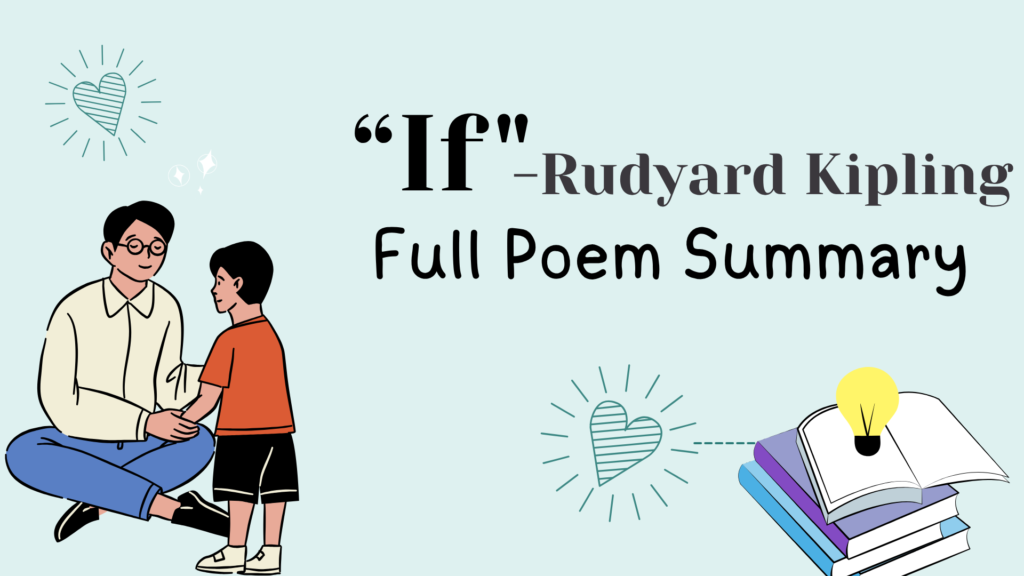The English Diary presents the master piece “If” by Rudyard Kipling summary.

“He who conquers himself is the mightiest warrior.” — Confucius.
This timeless wisdom perfectly frames Rudyard Kipling’s celebrated poem If. It stands as an enduring guide for shaping character through courage, patience, and unwavering moral resolve. First published in Rewards and Fairies in 1910, the poem lays out a roadmap for facing life’s trials with a calm head and a stout heart. Kipling anchors each life lesson around the small yet powerful word if. Step by step, he builds a ladder of conditions that one must climb to reach true greatness—if only they can meet them all.
Hope you feel the summary of “If” by Rudyard Kipling useful.
Kipling begins with a powerful call to keep composure when the world is losing its sense. It echoes the modern wisdom to “Keep calm and carry on.” This timeless line reminds us that true strength lies in mastering our reactions. The poet urges his reader—his son and, symbolically, every young mind—to trust themselves, even when others doubt them. Yet, at the same time, he teaches them to respect and value the advice of others too. True confidence must never sour into arrogance, for “Pride goes before destruction,“ as the proverb warns.
Patience is another pillar of Kipling’s vision. He advises waiting and enduring without growing weary, facing lies and hatred without becoming deceitful or spiteful in return. Humility remains vital, as Kipling cautions against becoming too self-righteous—after all, “Empty vessels make the most noise,” and the wise often act with quiet dignity instead of loud boasting.
The poet then guides us through life’s inevitable ups and downs. Triumph and disaster, he says, are impostors—illusions we must greet with equal calm. If tricksters twist your honest words, stand firm. If your life’s work is shattered overnight, gather the courage to start anew without complaint. It is here that Kipling’s stoic philosophy shines bright—“When the going gets tough, the tough get going.“
He also dares us to stake all our gains on a single chance, and if we lose, to begin again with a brave heart and a sealed mouth. Kipling believes that true strength does not lie in outward success alone. Instead, it comes from an inner, iron will that pushes us forward. Even when our bodies are exhausted and ready to collapse, this determination helps us carry on. Mastering our impulses is greater than ruling any kingdom.
A balanced life, according to Kipling, means walking with crowds yet keeping your virtue, dining with kings yet never forgetting your roots. Neither friends nor foes should break your spirit. Respect all, but worship none blindly—because “Character is how you treat those who can do nothing for you.“ Every moment, he insists, must be filled with purposeful action—“Make hay while the sun shines,” because time waits for no one.
Finally, Kipling ends with a timeless promise. If one lives by these “ifs,” then “Yours is the Earth and everything that’s in it, and—which is more—you’ll be a Man, my son!” This final line is more than a father’s blessing. It is a universal call to embrace true adulthood. Strength, humility, self-belief, and moral courage become the foundation of a life well-lived.
Kipling’s “If—“ remains more than a father’s letter—it is a lamp for all who wish to stand strong when storms come. It teaches us that greatness is possible for anyone if they dare to live by these timeless truths.
“Success is not final, failure is not fatal: it is the courage to continue that counts.” — Winston Churchill.